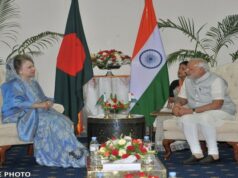The ruling against exiled Russian journalist Alexander Nevzorov and his wife Lidia by a court in St Petersburg imposed a ban on their alleged extremist activities.
It confiscated three plots of land, one building, a vehicle and some company shares belonging to the couple, a court spokesperson said.
Nevzorov said in a YouTube interview that he viewed the ruling as a test case that was likely to pave the way for similar actions against others. He said the financial aspect was less important than the message the ruling aimed to send.
“This is the first such case in the legal history of humanity. That is remarkable, of course,” he said.
“The Putin state absolutely doesn’t give a damn what pennies it can grab as a result of these confiscations. Of course, they
need to intimidate people.”
Nezvorov, who now lives outside Russia, shot to fame in the 1980s as host of a news show called “600 seconds”, as Soviet President Mikhail Gorbachev’s “glasnost” reforms enabled journalists, for the first time, to run hard-hitting investigations on sensitive topics such as corruption.
Since Russia’s February 2022 invasion of Ukraine, he has been a frequent critic of President Vladimir Putin and the war on his YouTube channel, where he has nearly 2 million subscribers.
In February 2023, he was sentenced in absentia to eight years in prison for spreading “fake news” about the armed forces.
The Kremlin says Russia is fighting an existential war in Ukraine that requires the population to unite behind Putin. Authorities have portrayed Russians who have fled the country and condemned the war from abroad as traitors and back-stabbers.
In January, the lower house of parliament passed a law allowing the seizure of property in Russia from people abroad who “discredit” or spread false news about the army, incite extremist activity or call for sanctions against Russia.
No price was too high for his personal freedom, and he was satisfied with the court ruling, Nevzorov said.
“I’m the first person who was able to experience the sweetness of totally breaking – even in the smallest material things – with the cannibalistic, degenerate regime of Russia, with everything that was dear to me there or for some reason important,” he said.
Thirty eight years in journalism, widely travelled, history buff with a preference for Old Monk Rum. Current interest/focus spans China, Technology and Trade. Recent reads: Steven Colls Directorate S and Alexander Frater's Chasing the Monsoon. Netflix/Prime video junkie. Loves animal videos on Facebook. Reluctant tweeter.




